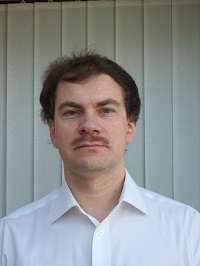Yurii Gun'ko
Yurii Gun'ko (Russian: Юрий Гунько), born in USSR, Belarusian scientists, professor of Inorganic Chemistry at School of Chemistry of Trinity College Dublin[1] (Dublin, Ireland), head of the International research and education centre for physics of nanostructures.
Yurii Gun'ko | |
|---|---|
 | |
| Born | |
| Citizenship | Belarus |
| Alma mater | Moscow State University |
| Known for |
|
| Scientific career | |
| Fields | Chemistry |
| Institutions | Trinity College Dublin |
Education
Yurii Gun'ko graduated from Moscow State University in 1987. In 1990 he received Ph.D in Inorganic Chemistry degree from Moscow State University.
Career
| Year | Position/Research area | Affiliation |
|---|---|---|
| 1993-1994 | Postdoctoral Fellow (Royal Society Award): research on organolanthanides with professor M.F. Lappert[2] | University of Sussex (UK) |
| 1994-1995 | Senior Lecturer in Chemistry and Materials for Electronics | Belarusian National Technical University |
| 1995-1996 | Postdoctoral Fellow (Alexander von Humboldt Award): research on organosilicon compounds | University of Magdeburg (Germany) |
| 1996-1998 | Postdoctoral Researcher: research on organolanthanides (EPSRC) | University of Sussex |
| 1999-2007 | Lecturer in Inorganic Chemistry | Trinity College Dublin |
| 2007–present | Professor of Inorganic Chemistry | Trinity College Dublin |
| 2011–present | Head of Inorganic and Synthetic Materials Chemistry | Trinity College Dublin |
| 2014–present | Head of the laboratory | International research and education center for physics of nanostructures[3] of ITMO University |
Publications
Yurii Gun'ko has over 268 publications in peer reviewed journals and 10 patents.[4] His h-index is 51.[5]
Awards
| Date | Award |
|---|---|
| 1993 | Royal Society Fellowship Award |
| 1995 | Alexander von Humboldt Award |
| 2008 | Enterprise Ireland Industrial Technologies Commercialisation Award |
Research Areas
Prof. Gun'ko has expertise in the areas of inorganic chemistry, science of materials and nanotechnology. His main research interests and activities include magnetic nanoparticles and magnetic fluids for MRI applications; metallasiloxanes; functionalisation of carbon nanotubes; and quantum dots for biomedical applications. The research focuses on the synthesis and characterisation of functional materials and nano-materials.